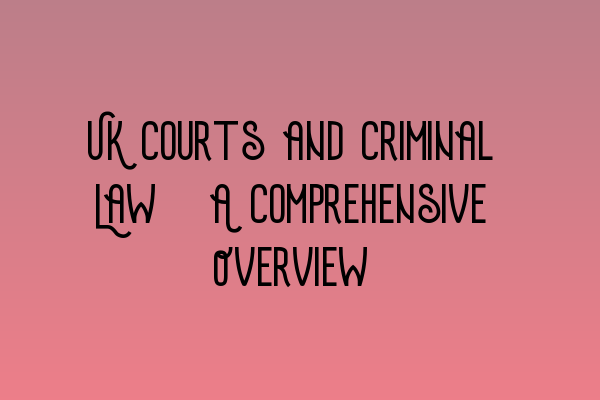UK Courts and Criminal Law: A Comprehensive Overview
Introduction:
Welcome to SQE Criminal Law & Practice Law UK, where we provide expert legal services for all your criminal law needs. In this blog post, we will take you on a comprehensive journey through the UK court system and criminal law. Whether you are a law student, aspiring solicitor, or simply interested in gaining a deeper understanding of the UK legal framework, this article is for you. So, let’s dive right in!
1. Understanding the UK Court Hierarchy:
The UK court system is structured hierarchically, with different levels of courts having varying jurisdictions and powers. The Supreme Court stands at the peak, followed by the Court of Appeal, High Court, Crown Court, and Magistrates’ Court. Each court plays a crucial role in the administration of criminal justice.
2. Roles and Responsibilities of Courts:
(a) Supreme Court: The final court of appeal in the UK, the Supreme Court primarily deals with points of law. It safeguards the rule of law and ensures justice is served.
(b) Court of Appeal: The Court of Appeal hears appeals from the Crown Court and deals with matters of important legal precedent. Additionally, it has jurisdiction over civil and criminal cases.
(c) High Court: With both civil and criminal divisions, the High Court has the power to handle complex cases and provides judgments that become precedents for lower courts.
(d) Crown Court: The Crown Court deals with serious criminal cases, including indictable offenses. It has the authority to impose more severe penalties compared to the Magistrates’ Court.
(e) Magistrates’ Court: The Magistrates’ Court deals with less serious criminal cases, such as summary offenses. Magistrates, who are laypeople, preside over the court and play a pivotal role in the criminal justice system.
3. Criminal Law in the UK:
Criminal law in the UK governs conduct that is considered harmful to society. It is essential to understand the key principles and elements of criminal law to ensure justice is served. Some key areas covered by criminal law include:
(a) Actus Reus and Mens Rea: In criminal cases, there must be a physical act (actus reus) combined with a guilty mind (mens rea) for an offense to be committed. Understanding these two concepts is crucial when determining criminal liability.
(b) Offenses and Penalties: Criminal offenses vary in severity, ranging from minor to major offenses. The penalties can include imprisonment, fines, community orders, or a combination of these.
(c) Defenses: A range of defenses can be used in criminal cases to challenge the charges. These include self-defense, duress, necessity, or lack of intent.
4. Legal Procedure in Criminal Cases:
The legal procedure in criminal cases is carefully designed to ensure fairness and justice. It includes key stages such as:
(a) Investigation and Arrest: The police investigate criminal offenses and make arrests where necessary. Suspects are then brought before the court for bail hearings.
(b) Charging and Bail: The Crown Prosecution Service (CPS) reviews evidence and decides whether to charge the suspect. Bail is granted in some cases, ensuring the accused’s release until trial.
(c) Plea and Trial: The accused can enter a plea of guilty or not guilty. If the plea is not guilty, a trial takes place where evidence is presented and witnesses are called.
(d) Sentencing: If found guilty, the judge considers various factors to determine an appropriate sentence. These can include the seriousness of the offense, the defendant’s character, and any mitigating circumstances.
5. Importance of Legal Representation:
Legal representation is crucial in criminal cases to ensure a fair trial and protect the rights of the accused. Solicitors and barristers are legal professionals who provide expert advice, prepare the case, and represent clients in court. Having the right legal team can greatly impact the outcome of a case.
Conclusion:
We hope this comprehensive overview of the UK court system and criminal law has provided you with valuable insights. Remember, understanding the legal framework is essential for aspiring solicitors and anyone interested in the UK justice system. If you require expert legal advice or assistance, SQE Criminal Law & Practice Law UK is here to help. Contact us for all your criminal law needs.
